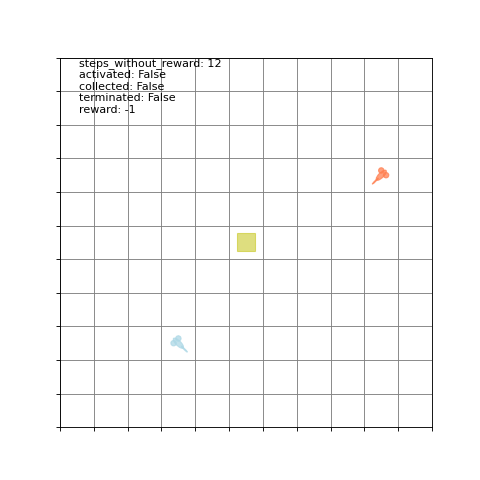Source code for marlax.agents.qagent
"""
QAgent implementation using Q-learning for MARLAX.
This agent maintains a Q-table mapping global states to action values
and selects actions via an epsilon-greedy strategy.
"""
from marlax.abstracts import Agent
import random
[docs]
class QAgent(Agent):
"""
Q-learning agent that chooses actions based on a Q-table.
Attributes:
position (tuple): Agent's (x, y) position on the grid.
actions (list): List of possible actions.
q_table (dict): Maps state_key to a dict of action->value.
"""
[docs]
def __init__(self, init_position = None, actions = ['stay', 'up', 'down', 'left', 'right']):
"""
Initialize an agent with a starting position and possible actions.
Args:
init_position (tuple, optional): The (x, y) starting coordinates. Defaults to None.
actions (list of str, optional): Available actions. Defaults to ['stay', 'up', 'down', 'left', 'right'].
"""
self.position = init_position # Agent's (x, y) position on the grid.
self.actions = actions # List of possible actions.
# Q-table: maps global state (all agents' positions + active reward target) to action values.
# default dict with partial that defaults to 0.0
self.q_table = {}
[docs]
def choose(self, possible_states, epsilon=0.1, agent_id = 0):
"""
Select an action using an epsilon-greedy policy.
Args:
possible_states (list): List of global state keys to evaluate.
epsilon (float): Exploration probability. Defaults to 0.1.
agent_id (int): Identifier for this agent among multiple agents. Defaults to 0.
Returns:
str: The chosen action.
"""
if random.random() < epsilon:
return random.choice(self.actions)
else:
# for all the possible states, get the action with the highest q-value
best_state = self.get_max_state(possible_states)
best_possible_q_value = float('-inf')
best_possible_action = None
for action in self.actions:
if self.q_table[best_state][action] > best_possible_q_value:
best_possible_action = action
best_possible_q_value = self.q_table[best_state][action]
return best_possible_action
[docs]
def get_max_state(self, possible_states):
"""
Identify the state with the highest max Q-value.
This helper initializes missing table entries to zero.
Args:
possible_states (list): List of global state keys.
Returns:
any: The state_key with the highest action value.
"""
best_possible_action = None
best_possible_q_value = float('-inf')
best_state = None
for state_key in possible_states:
if state_key not in self.q_table:
self.q_table[state_key] = {a: 0.0 for a in self.actions}
best_action = None
best_q_value = float('-inf')
for action in self.actions:
if self.q_table[state_key][action] > best_q_value:
best_action = action
best_q_value = self.q_table[state_key][action]
if best_q_value > best_possible_q_value:
best_possible_action = best_action
best_possible_q_value = best_q_value
best_state = state_key
return best_state
[docs]
def update(self, state_key, action, reward, next_state_key, alpha=0.1, gamma=0.99):
"""
Update the Q-table entry for a given state and action.
Applies the Q-learning update rule:
$$Q(s,a) = Q(s,a) + alpha * (r + gamma * max_a Q(s',a) - Q(s,a))$$
where:
- $s$ is the current state,
- $a$ is the action taken,
- $r$ is the received reward,
- $s'$ is the next state,
- $max_a Q(s',a)$ is the maximum Q-value for the next state.
Args:
state_key (any): Current global state key.
action (str): Action taken by the agent.
reward (float): Reward received after action.
next_state_key (any): Next global state key.
alpha (float): Learning rate. Defaults to 0.1.
gamma (float): Discount factor. Defaults to 0.99.
"""
if state_key not in self.q_table:
self.q_table[state_key] = {a: 0.0 for a in self.actions}
if next_state_key not in self.q_table:
self.q_table[next_state_key] = {a: 0.0 for a in self.actions}
best_next_value = max(self.q_table[next_state_key].values())
td_target = reward + gamma * best_next_value
td_error = td_target - self.q_table[state_key][action]
self.q_table[state_key][action] += alpha * td_error
